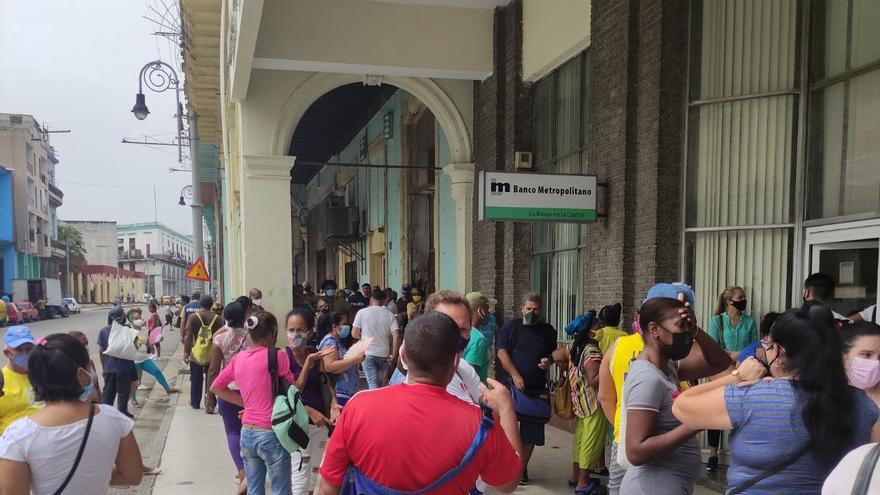
![]() 14ymedio, Havana, 18 June 2021 — With June 20 fast approaching — the date after which Cubans will not be allowed to deposit U.S. banknotes in their bank accounts — people are increasingly wary about about exchanging their pesos for hard currency. At Telegram bureaus around town the exchange rate has been hovering at 80 to 85 pesos to the euro and around 60 pesos to the dollar. Few customers, however, are willing to take the plunge given the uncertainty created by recent government actions.
14ymedio, Havana, 18 June 2021 — With June 20 fast approaching — the date after which Cubans will not be allowed to deposit U.S. banknotes in their bank accounts — people are increasingly wary about about exchanging their pesos for hard currency. At Telegram bureaus around town the exchange rate has been hovering at 80 to 85 pesos to the euro and around 60 pesos to the dollar. Few customers, however, are willing to take the plunge given the uncertainty created by recent government actions.
“Announcements are one thing but reality is another. I’m not buying or selling anything right now,” says Alejandro Medina, a 41-year-old private-sector worker. “I posted an ad four days ago offering 60 pesos to the dollar and no one, not one person, has contacted me. Everyone is hesitant because there’s so much uncertainty.” According to Medina, people are waiting to see what happens over the weekend.
That is what currency exchange “professionals” are also recommending. “The ’bigheads’ (dollars) fell out of favor,” complains Papito, a black market money changer who was contacted by a dozen or so clients, suddenly eager to get rid of their dollars. “I told them not to go crazy, to wait, that I am not interested in buying them now. The dollar is still the dollar. We have to wait and see what happens.”
Adorned with enormous portraits of America’s founding fathers, the most recent dollar bills have recently earned the nickname cabezón (or big head) to distinguish them from earlier denominations, whose central images were smaller. It joins a long list of nicknames for the dollar that includes greens, fulas* and enemy currency.
Though the European Union’s currency is now the leading candidate to replace the U.S. dollar, it is viewed with suspicion here. “People are just not as familiar with the euro. It’s a different size. Some of its bills don’t even fit in my wallet,” complains Papito. “We need a crash course to be able to tell real euros from fake ones,” he jokes.
It is not just informal money changers who are having problems. “There are a lot of home delivery apps that require payment before the customer knows the total purchase price in pesos or dollars, even if the person is paying cash in a foreign currency. Will they now have to redesign the app?” asks Yunieski, a messenger who works for one of those services.
“With dollars, at least people knew that if the little old man on the bill was wrinkled and half bald, it was a hundred dollars. If he had a beard, then it was fifty. But with these European monuments, who knows? We all have to start studying,” he notes ironically.
Even so, Yunieski prefers the euro over the soon-to-be defunct convertible peso. I won’t accept tips in chavitos,” he says, “because it means spending long hours in line at a bank to exchange them. But I’ll take any euros, pounds sterling or yen that customers want to give me.”
For months it has been almost impossible to buy foreign currency of any kind from the island’s banks. A young man, who prefers to remain anonymous, reported that one day he saw a bank teller stuffing three large bundles of euros and dollars into a cash drawer. He asked her why he could not exchange his Cuban pesos for some of the banknotes. Without flinching, she responded, “They’re not available.” Undeterred, the young man asked her when the bank would be selling dollars and euros. “You can buy them on the street,” she advised him.
After the government imposed tight controls on foreign exchange operations, some banks began doing a brisk business selling freely convertible currency (MLC) “under the table.”
So claims a 28-year-old computer programmer who has an account at Havana’s Banco Metropolitano, which allows him to receive foreign currency transfers that he can then access with a debit card to make purchases at MLC stores.
He reports that he contacted the branch bank where he has his foreign currency account. He was told that, for a percentage of the total transfer amount, an employee could let him know when there are enough euros in the till or the vault for him to make a withdrawal.
Meanwhile, if an ordinary customer were to go to the bank and ask to withdraw 100 euros from his account, he would receive the same reply: “Unfortunately, we do not have that amount on hand.”
The official press reported that banks will extend their weekend hours to make sure account holders have time to make cash deposits in U.S. dollars. Banco Metropolitano will be open on Friday and Saturday from 8:30 am to 3:30 pm; on Sunday from 8:30 am to 12:30 pm. Banco de Crédito y Comercio and Banco Popular de Ahorro will be open on Friday from 8 am to 3 pm; on Saturday from 8 am to 11 am, and on Sunday from 8 am to 12 pm.
*Translator’s note: In Cuba, the word “fula” is otherwise used to describe someone who is troublesome or cannot be trusted.
____________
COLLABORATE WITH OUR WORK: The 14ymedio team is committed to practicing serious journalism that reflects Cuba’s reality in all its depth. Thank you for joining us on this long journey. We invite you to continue supporting us by becoming a member of 14ymedio now. Together we can continue transforming journalism in Cuba.
